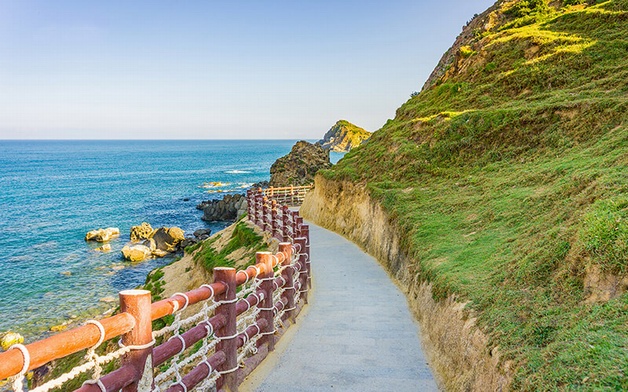Along the central coast

As we continued our journey north, we visited two coastal areas in the
central portion of Vietnam - first the very popular
beach-party city of Nha
Trang and then the much quieter, less touristy town of Quy Nhon. We only
stayed in Nha Trang for one day, enough time to try the micro-brews at the
New Zealand-owned “Louisiane Brew House” - the first microbrewery we’ve seen
in Vietnam. For those of you who know Joe well, you won’t be surprised to
hear that he was very happy about this particular stop, so much so that he
tried nearly every beer on the menu. I was intrigued by the ginger beer
brewed with passion fruit and wasn’t disappointed. Very fruity!
You may be interested in:
►►► Top 10 most beautiful hilltop homestays in Da Lat
►►► Travel though Vietnam by sleeper bus: practical and friendly
►►► How to book cheap Vietnam flights
The next day we got back on a mini-bus (not as comfortable as the big bus)
and traveled four hours to Quy Nhon - pronounced “Qwe Nyun”, a sleepy
fishing village that many tourists skip on their treks up and down the
country. That was okay with us as we are finding that the less traveled
places here hold more interest to us; they are a little harder to navigate
because fewer people speak English but I think we get a better picture of
how the average Vietnamese person lives and there are far fewer touts to
chase us down the street for a cyclo ride or some other offering. We have
actually been quite surprised by how many people
travel in Vietnam. Probably
every other young Vietnamese person we meet here works in the travel and
tourism industry (this could be biased since we’ve staying in a lot of
hotels and hanging out in highly touristed areas). We didn’t expect to see
many Westerners, but in the major tourist areas we see tons. I would
estimate that 80-90% of tourists here are Australian. We’ve never met so
many Aussies in our life, and we had no idea there was a large Vietnamese
population in Australia and lots of exchange between the two countries. We
think the next largest group of travelers is from England - loads of
British. We’ve also come across some New Zealanders and some Germans and
French. To round things out, we met one Swedish woman who adopted a
Vietnamese baby 10 years ago, two very nice Dutch women, a few Canadians
(although we think one was really from America, but didn’t want to admit
it!), one Austrian and one Argentinean couple, and maybe four Americans.
Ok, back to Quy Nhon. Quy Non is a charming fishing village and resort town
close to many beautiful beaches including one at the edge of town and one at
the local Leper Hospital (who would have known)! At night, the town is
converted into one huge outdoor café where residents sip sugarcane juice or
coconut juice milk they relax on lawn chairs that have been set up along the
beach and in the town parks. Parents lounge about while their kids run
around and play, and young couples hold hands and gaze at the ocean
together. Bicycle vendors ride up and down the beach pedaling popcorn or ice
cream (“Kem” in Vietnamese) while their music boxes play “Happy Birthday” or
“Merry Christmas.” A one-man mobile Karaoke show stops at various places
along the beach road and serenades the diners at local restaurants.
Because the town sees relatively few Westerners, we attracted a fair amount
of attention from the locals. We estimate that about 90% of the children in
that town shouted hello to us - no matter where they were in relation to us
or what they were doing. Even families driving by on their motorbike often
shouted hello to us! We have come to believe that shouting “Allo”, “what’s
your name?” and “where you from” to Westerners has become a minor sport for
the kids in the city. We were an even bigger focus of attention, stares,
whispers, and giggles when we went shopping for toiletries and some new
clothes in the town’s new (air conditioned) mall.
In some ways Quy Nhon was a difficult stop for us because we had to
re-adjust to the heat after being spoiled by the cool temperatures in
Da Lat.
The heat seemed that much more aversive after the coolness of Dalat - a
contrast effect, I’m sure. But, we also had some pretty awesome experiences
connecting with people in the community in a way that we hadn’t been able to
previously. For example, when we biked over to the Linh Kan Pagoda in the
late afternoon on our first day in the town, we were greeted by a young man
by the name of Tu’ who was studying to be a monk and living at the Pagoda
for the summer. We weren’t quite sure what was happening when he
immediately began giving us a tour of the Pagoda and explaining, in broken
English, who he was, what he did, and what the Pagoda was about. But he was
simply eager to tell us about himself and practice his English, which he had
been diligently studying for the past three months. He lives at the Pagoda
in the summer when he comes back from University in
Ho Chi Minh city where he is
studying Buddhism. As far we could understand, he spend most of his days at
the Pagoda praying for people who have died but have no family to pray for
their souls. When he finished showing us around the Pagoda, he invited us to
his room where we shared tea with him as part of a Chinese tea ceremony that
he led. It’s hard to put into words how cool it was have this interaction,
and how moved we were by Tu’s kindness. Before we left, he gave both Joe and
I prayer beads to wear around our wrist. He didn’t want anything from us; he
just wanted to share his story with us and hear ours. This is the deeper
connection we’ve been looking for since we’ve been in Vietnam, but have had
difficulty finding because of the language barrier.
You may be interested in:
►►► Halong cruises - Sapa tours
►►► Hanoi day trips
►►► Saigon excursions
We were lucky again in this regard when we motorbiked over to the beautiful
Bai Bau beach outside of town and coincidentally bumped into (almost
literally) a Vietnamese man named Hai (pronounced Hi) who grew up in Quy
Nhon but has been living in North Carolina for the past 30 years. We struck
up a conversation and ended up sitting on the beach, swimming, and
eventually going out to dinner together. Hai was back home visiting his
elderly parents who are in poor health. He shared with us some riveting
stories about his life, including a perilous escape from Vietnam in 1978
when he was just 17 years old.
Hai started by telling us that, as the son of a fisherman, he learned how to
sail and work a boat at an early age. So in 1978, amid food shortages and
little opportunity for any sort of future, Hai’s cousin who worked for the
US government offered him an opportunity to flee Vietnam if he could captain
the escape boat. Hai’s family was so poor that his mother had to borrow the
meager sum from a neighbor to pay for the bus fare from Quy Nhon to Saigon,
where the boat would depart. Hai’s trip to Sai Gon was dangerous in itself
because at that time people risked arrest if they traveled outside of their
home towns. He couldn’t speak in public because his Central Vietnamese
accent would give him away as being from outside of Saigon. He was
instructed to just shake his head yes or no.
On the night of the escape, a group of 37 adults and children ran for the
boat at 3 in the morning trying not to be detected amid the barking dogs.
Once on the boat, Hai learned that the man who organized the boat didn’t
know how to start it. After a frantic search, with the dogs still barking in
the background, Hai located a hand crank and started the engine. They sailed
without incident until the second day when a storm blew in that threatened
to capsize the boat. Waves splashed over the boat, and at one point the boat
passed directly through a wave and emerged on the other side. In the end,
with a fair amount of luck and sailing skill they made it through the
storm.
The refuges sailed for four nights and three days with very little food,
water, fuel, or sleep. On the third day they attempted to flag down a French
freighter but it continued past them. Just as they started to think they
missed their only rescue opportunity, the freighter returned for them.
Apparently, the captain of the French boat had to get permission to rescue
the refuges from the “sinking” boat before he could turn around. Once all
the refuges were safely on the freighter, Hai was told to take an axe to his
boat so that the French could photograph him being rescued from the sinking
boat. Hai and the rest of the refuges were taken to Hong Kong where they
received medical attention, food and water.
When Hai came to the U.S. nine months later, he struggled to learn English,
find a job, get an education, support his family back home, and thrive as a
minority in the country. He told us that it took him one month just to make
enough money to pay for the postage he needed to send a letter home to his
parents to tell them he was safe. He worked extremely hard all of his life
(certainly harder than Joe and I have ever had to work) to raise a family,
educate his kids, and live the American dream. Now he is a mechanical
engineer and has a teaching gig at North Carolina State University (he also
has a very funny mixture of Vietnamese accent and southern drawl)! His
integrity, work ethic, and sense of family responsibility are inspiring. He
still pays for his parents’ medical care and whatever else they need. Joe
and I were happy because we were able to give him my extra rescue asthma
inhaler so his father could get some better relief for his asthma. (We were
very surprised to learn that not only does Vietnam not have universal health
care, it is apparently very expensive to get health care here and
doctors/hospitals require up-front payment before they will provide
treatment. No money, no treatment - period. As far as we understand, there
is no safety net health care system here).
After we watched the sun set behind the mountains, we followed Hai to his
parent’s house in town and waited for him while he called around to find the
best seafood restaurant in Quy Nhon. When we arrived, he ordered all these
wonderful Vietnamese specialties, including my favorite - seafood hot pot
(see forthcoming food blog), and he paid for dinner!
We feel indebted to him for his warmth and generosity; it makes us feel good
about being in Vietnam.
You may be interested in:
►►► Budget Asia tours
►►► Cheap tours to Vietnam





